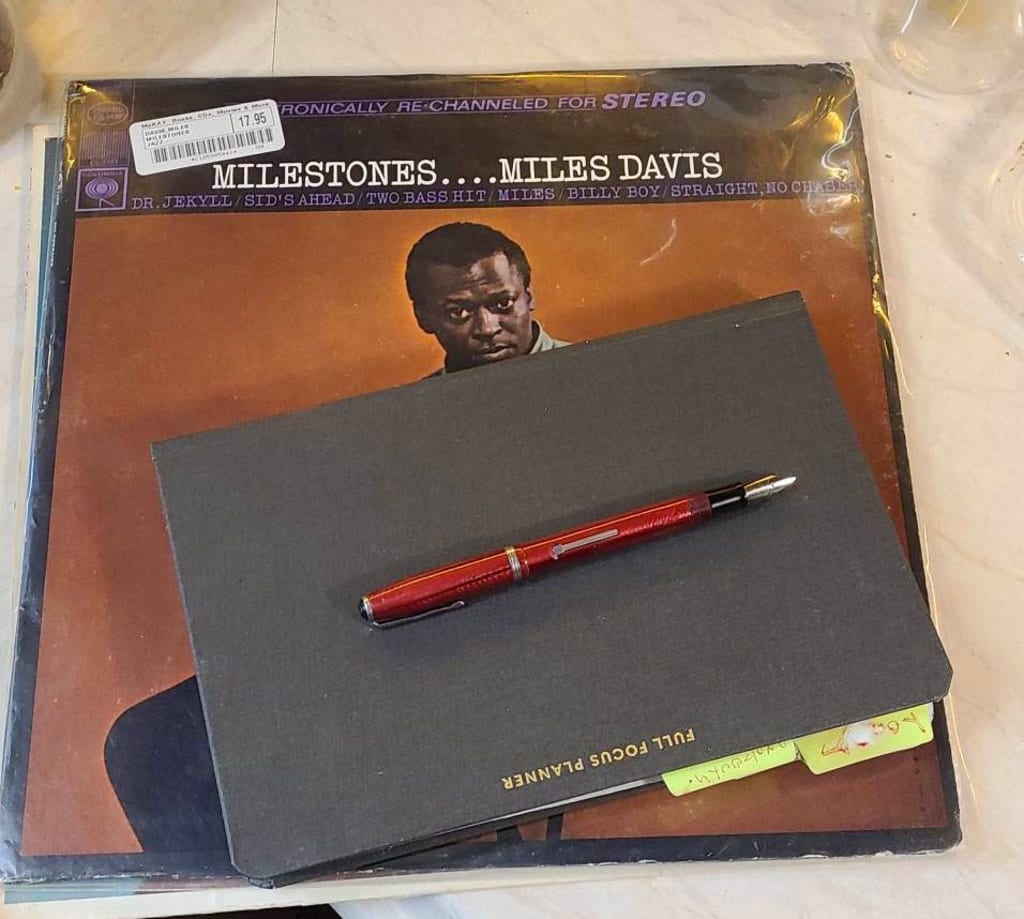Of Fountian Pens and Vinyl
Kenneth Lawson

In a world of instant music, television, and screens on every imaginable device, I use what many of you would call obsolete technologies. I use fountain pens and a paper planner for everyday notes and writing. I often listen to vinyl records on a turntable when listening to music.
You may wonder why anyone would use such “outdated technologies” when there are many more efficient and “better” ways to do the same things. That is exactly what I’d like to explain to you. But first, a bit about me so you better understand where I come from and how I got here.
You may have heard the term “Baby Boomer,” anyone born between roughly 1946 through 1961, depending on who you ask. This means I’ve seen technological advancements in the last forty-plus years. I've experienced the progression from vinyl records, cassettes, 8-tracks to Mp3s, digital downloads, Netflix, streaming, and high-speed internet.
For the most part, I embrace new technology. Besides the historical value, there are many reasons to use old technologies like fountain pens and vinyl records. Take vinyl records, and why I collect and play them. As a teenager, I bought and collected records and still have records from back then. This leads to my first point.
Vinyl Records
Records are relatively indestructible. That is not to say a record can’t be destroyed and rendered unplayable. They can, but it takes a lot to destroy a record to the point where it can’t be played. I have records with scratches, and they still play, but they are not as good as they should be. They’re playable, but I would avoid playing them on a good turntable. Be it a reissue of a classic album or an original 60-plus-year-old copy. It will play if unblemished.
Can the same be said of our digital formats and media? To my mind, no. While the data may exist online, accessing it is questionable. The early 1970s cassettes that held computer data on tape are virtually useless now because there are no longer any machines available to play them on—one example of orphaned media. Several modern formats, vinyl, CD, DVD, blue ray, etc., remain available, but one must wonder when they too will become extinct as the equipment to play them on is no longer readily available.
But there is another valid reason to play vinyl still. Ownership. When you have a physical copy of a record, you own it. There are certain things, such as playing it in public and trying to make money from doing so, that you can’t do, but privately you can do what you want with it, make copies onto tape, share the record with a friend, etc. There is no digital license that limits your access to it. Record companies don’t care what you do with it as they’ve long ago forgotten about it.
However, if you “own” the same record in a digital download or on service, that’s entirely different. While streaming services are handy, convenient, and a great way to discover new content, you are subject to a licensing agreement that you probably never saw or read, and if you did read it, didn’t understand it. It means you are “renting” a license to access this content on their servers. The copyright holders have total control over how their content is distributed, and if they want to, they can pull content from a service or cloud, making what you “bought” null and void. Also, your content's availability is subject to having an internet connection and a decent speed. Something that is not a requirement for vinyl.
Another reason for using vinyl is that by collecting and playing records, you’re helping to preserve the physical history of music dating back to the early 78 RPM records. Records containing the music and artists that have been forgotten are now a part of history. Some may be the only copies of the music that exist. That’s probably a little extreme, but I expect it to be true, at least to a degree, but the sentiment remains the same, be it the Beatles, Elvis, Little Richard, or any other artist whose time has come and gone.
Beyond that, there’s a tactile experience of selecting a record, carefully placing it on the turntable, gently lowering the needle, and hearing the first notes of a record. And reading the liner notes on the jacket as the songs play. Flipping through a collection and finding a record you forgot you had, rediscovering it, and enjoying the music you’d forgotten about.
Today, finding the music you grew up with and replaying the lost songs of your past is relatively easy. Used records can be found at Goodwill and other thrift stores. But there is a big caveat with those places. The records tend to be well-worn and not in the best shape. I’ve purchased a few that weren’t playable, but that’s part of the adventure of finding records.
Fortunately, thrift stores are only one place to find records. Walmart, Target, and most big box stores now have a small record collection. If these are not your thing, you can order them on Amazon. It would be best if you also had a turntable, a preamp and amplifier, and speakers. You can find many of these items in the used market. However, research must be done to learn about the various brands and specifications, but don’t let that scare you from exploring vinyl records. The rewards far outweigh the hassle.
Fountain Pens
Another older ‘technology that I use is fountain pens. While most of the world types their notes, to-do lists, novels, and other daily writing on a keypad, I choose to write on paper with a fountain pen, including the notes for this article. I know I could use a ballpoint pen, but something about the feel of a fountain pen makes writing pleasurable.
My journey into fountain pens was more of an accident than anything else. I had been watching YouTube and saw a video that looked interesting, and before I knew it, I was spending a week learning about them and what an excellent entry-level pen was. I settled on a Pilot Metropolitan, a metal pen that uses cartilage for ink. It's still writing as well as it did back in January 2019.
I now have a couple of “new” pens and a couple of “vintage” pens. First, let’s define new. For me, “new” is anything currently in production. Many companies are still making models they’ve been making for fifty and sixty years or more. A vintage is a pen that is no longer made. In some cases, the company no longer exists.
The world of fountain pens is much more encompassing than one would imagine. Without going into too many details, the hobby has several broad aspects. First, some pens can range from cheap, economical pens that work much better than their price suggests to one-of-a-kind, limited-edition pens in various materials that can cost a small fortune.
The ink that goes in them is also a vast universe. Makers range from the old stewards of the industry, many of whom also make modern ballpoint pens and other supplies, to custom makers who create unique colors and variations. Choosing just the right ink for a particular pen or its planned use is a large part of the hobby. Of course, you don’t have to use an exotic color. You can easily use a traditional blue or my preferred black, which I always have at least one pen inked in.
The third aspect of the hobby is paper. Yes, paper. I haven’t gotten into this aspect yet, but I plan to learn more about paper as pen and ink react differently depending on the paper you write on. Cheap printer paper tends to be glossy, has a low weight, and does not work well with fountain pens. In contrast, heavier paper and paper that is ink friendly will give you a better experience and show off the ink better. The paper is a little more subjective. What feels and looks good to one may not feel or look good to a more experienced user. The choice of materials and nib sizes for modern pens is limited to a few basic materials and types of points on the pens. However, one can have a wide vanity of nips on the same pen, as swapping nips is possible.
So why has a 60-plus-year-old man gone back to technologies that predate him? The obvious answer is nostalgia. I grew up collecting and playing records, and it’s natural for me to continue to do. As I’ve gotten older and learned to appreciate and understand our history and the importance of preserving it, things like classic movies and music and the media in which they’re played become more important to preserve a tiny piece of our past. But there’s also a fun element too.
My son and I have spent many hours in record stores flipping through bins of records. Most of the time, not knowing exactly what we’re looking for, but knowing it when we find it. There is satisfaction in finding a new copy of a record you had as a kid or finding an elusive record you always wanted. That’s not even counting discovering artists and music you didn’t know about, which is always good.
Fountain pens and paper are a way to connect with history. But more importantly, I learned over the years that I need to write things down to remember them and document what I’ve done. I use a paper planner in conjunction with Google Calendar, and some of what's on the digital calendar end up in my planner. But there's a lot more that doesn’t go to the digital calendar—things such as my to-do list, ideas for stories, and ideas for projects such as this. When I write a book, I do what I call a “Project Book.” It contains notes on the story as I go along and any details I may need to refer to later in the project. All these notes are written with a fountain pen.
I’m going to listen to this music and write these notes and to-do anyway, so why not do it with an 80-year-old pen and a vinyl record that's preserving history?
Hopefully, this has inspired you to consider exploring the world of fountain pens and vinyl records. There is a world of pens and ink and records for you to explore. There is also a thriving community of vinyl records and stereo enthusiasts whose content will help you learn about these fascinating hobbies.
About the Creator
Kenneth Lawson
Baby Boomer,Writer, Connoisseur of all things Classic: Movies, Television, Music, Vinyl, Cars, techonolgy
I write stories that bend genres and cross the boundries of time and space.
New Story every Month






Comments (1)
An interesting walk down memory lane. I'm 64, so we share much of the same history, including my past love for fountain pens (though I haven't used one in a long time). My wife in particular loves vinyl & finds it important always to have a functioning turntable in our home. Thank you for sharing this with us, Kenneth.